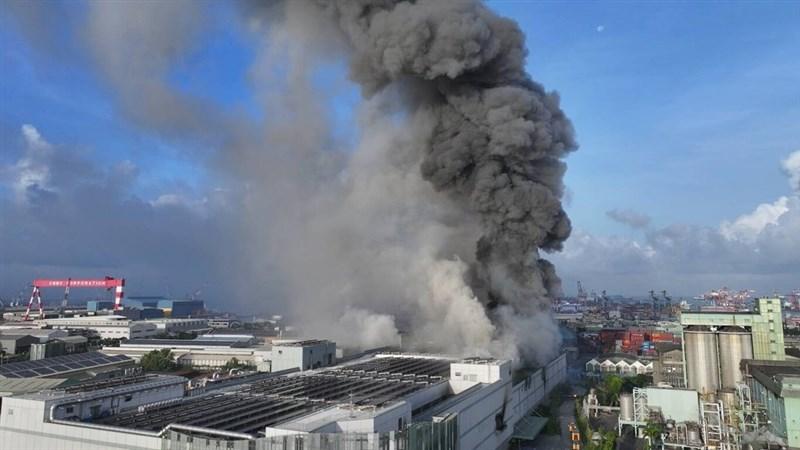Residents of 13 neighborhoods in Kaohsiung have been advised to stay indoors and close windows due to pollution following a fire this morning at a lithium-ion battery cell factory in Siaogang District (小港), Kaohsiung Mayor Chen Chi-mai (陳其邁) said.
The warning zone has been expanded after Molie Quantum Energy Corp's lithium-ion battery cell factory set fire early this morning, he said.
Air quality tests at about 10am revealed trace amounts of hydrogen fluoride, an irritant that can affect the respiratory system, skin and eyes, Chen said.

Photo courtesy of the Kaohsiung Fire Bureau
The Kaohsiung Fire Bureau received an automatic alert at 5:15am and dispatched firefighters to the scene by 5:20am, who brought the fire under control.
Twelve of the company's employees sustained abrasions and three firefighters sustained minor burns.
All have been taken to hospitals for treatment.
The cause of the incident is yet to be investigated.
Both the finished product zone set fire and the processing area set alight, Chen said.
Those living in the affected areas have been sent text alerts and told to limit outdoor activities and wear a face mask if going outside, he added.
The neighborhoods under advisory warnings are in Siaogang, Sanmin (三民), Lingya (苓雅) and Renwu (仁武) districts.
The Kaohsiung Environmental Protection Bureau said it detected high levels of fine particulate matter (PM2.5) in the area this morning, but did not find any toxic gases or hazardous substances.
The wind is blowing in a southwesterly direction, with areas up to 6km downwind experiencing high PM2.5 concentrations, it said.
Although air quality sensors did not detect any toxic gases or hazardous chemicals, the bureau said the plant would be fined between NT$100,000 and NT$5 million (US$3,418 and US$170,908) under the Air Pollution Control Act (空氣污染防制法) due to improper management.
TCC Group Holdings Co, the parent company of Molie Quantum Energy, said the fire originated in a warehouse storing semi-finished battery products.
The plant's automatic sprinkler system was activated immediately to help contain the blaze, TCC Group said in a statement.
The fire was quickly brought under control, the company said, adding that all employees were evacuated and that those injured have since been released from the hospital and returned home.
It also apologized to nearby residents for the poor air quality, adding that it would fully comply with follow-up investigations and improve safety measures.
The company said it has a comprehensive insurance policy and is currently assessing the damage, adding that its human resources department has set up a task force to assess employee wellbeing following the fire, implement health checks and offer follow-up support.
Additional reporting by Wang Jung-hsiang

The Coast Guard Administration (CGA) yesterday said it had deployed patrol vessels to expel a China Coast Guard ship and a Chinese fishing boat near Pratas Island (Dongsha Island, 東沙群島) in the South China Sea. The China Coast Guard vessel was 28 nautical miles (52km) northeast of Pratas at 6:15am on Thursday, approaching the island’s restricted waters, which extend 24 nautical miles from its shoreline, the CGA’s Dongsha-Nansha Branch said in a statement. The Tainan, a 2,000-tonne cutter, was deployed by the CGA to shadow the Chinese ship, which left the area at 2:39pm on Friday, the statement said. At 6:31pm on Friday,

The Chinese People’s Liberation Army Navy’s (PLAN) third aircraft carrier, the Fujian, would pose a steep challenge to Taiwan’s ability to defend itself against a full-scale invasion, a defense expert said yesterday. Institute of National Defense and Security Research analyst Chieh Chung (揭仲) made the comment hours after the PLAN confirmed the carrier recently passed through the Taiwan Strait to conduct “scientific research tests and training missions” in the South China Sea. China has two carriers in operation — the Liaoning and the Shandong — with the Fujian undergoing sea trials. Although the PLAN needs time to train the Fujian’s air wing and

The American Institute in Taiwan (AIT) put Taiwan in danger, Ma Ying-jeou Foundation director Hsiao Hsu-tsen (蕭旭岑) said yesterday, hours after the de facto US embassy said that Beijing had misinterpreted World War II-era documents to isolate Taiwan. The AIT’s comments harmed the Republic of China’s (ROC) national interests and contradicted a part of the “six assurances” stipulating that the US would not change its official position on Taiwan’s sovereignty, Hsiao said. The “six assurances,” which were given by then-US president Ronald Reagan to Taiwan in 1982, say that Washington would not set a date for ending arm sales to Taiwan, consult

A Taiwanese academic yesterday said that Chinese Ambassador to Denmark Wang Xuefeng (王雪峰) disrespected Denmark and Japan when he earlier this year allegedly asked Japan’s embassy to make Taiwan’s representatives leave an event in Copenhagen. The Danish-language Berlingske on Sunday reported the incident in an article with the headline “The emperor’s birthday ended in drama in Copenhagen: More conflict may be on the way between Denmark and China.” It said that on Feb. 26, the Japanese embassy in Denmark held an event for Japanese Emperor Naruhito’s birthday, with about 200 guests in attendance, including representatives from Taiwan. After addressing the Japanese hosts, Wang